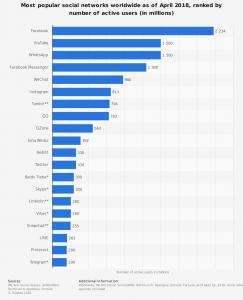Local search is going to be huge in 2016.
We saw last year how Google decreased its Local Pack (the group of featured business pages that show up in the SERPS). The switch from 7 local results to the new Google 3 Pack made serious waves in the SEO industry and small businesses everywhere. And that’s just the beginning.
Things are heating up, and they’re all set to boil over this year. A number of rising factors suggests that local search in 2016 should deserve your complete attention. Because now more than ever before, you have to meet the increasing demands of mobile users.
Trust us—this is something you do not want to miss.
Why You Should Focus on Local Search in 2016
Mobile is moving up in the world. Users continue to spend the majority of their total online time on mobile—51% compared to 42% on desktop as of last year. Why the steady increase? It’s easy to assume that it’s just because more people are using mobile devices like smartphones. But that doesn’t explain why you should focus so much on mobile this year. You need some real reasons.
Of course, you don’t really need an excuse to make your site the best it can be. But if that’s not enough, here are the 3 major reasons to focus on local search in 2016 based on recent news and trends:
#3: Wearable devices. As if we needed another reason to distance ourselves from desktop search. Wearable devices like the Apple Watch are becoming more than just conveniences; they’re becoming fashion accessories. Customers are asking Siri, Cortana, and whomever else to help them find the closest burger joint, nearest gas station, etc. A haptic feedback feature tells the wearer exactly where and when to turn to locate their destination. With that kind of power at the customer’s disposal, your business info MUST be kept up to date if you want to be found.
#2: No more Google Location tool. By December last year, pretty much every SEO company noticed that Google removed its Location search tool. The implications for this are huge: Google is now only—or mostly—showing local results to search queries. This shift away from global search results means many of your key terms may suddenly have a lot less reach. For example, “SEO company” is a pretty general term, while “San Diego SEO company” is more location-focused. This poses a potential problem for businesses that serve on a global scale (like ours), as it means users who search for “SEO company” may only get results based on what’s close-by.
If your business doesn’t have an actual brick-and-mortar location, the removal of this tool may cause some serious issues for your bottom line. And with only a 3 Pack to work with, you’ve got to vie for the top ad spots to make sure you stay on top of competitors.
#1: Google’s continuing focus on User Experience. No surprise here—Google is continuing its focus on better UX into 2016. And considering how many users are now on mobile, that experience had better be pretty dang good. We saved it for last on this list because, despite Google’s efforts, user experience is still something many websites aren’t prioritizing. It seems almost too simplistic, too vague—but that’s exactly why it’s still being overlooked. Your mobile site must first and foremost serve the user and make it as easy as possible to find what he or she needs. That means your site has got to be fast and informative.

How You Can Improve Your Local Presence
So how do you get into the Google 3 Pack? How do you get users to find and choose your company over the others out there? You have to take advantage of the changes we’ve already seen. And you have to get started now.
Luckily for you, there are 3 simple steps you can take. Implement them right away, and your business will benefit. Here’s what you can do:
3. Verify your business on Google My Business. Yes—you need to have a Google My Business account, even if you already have a website. Just like submitting your robots.txt file is a step you need to take to get indexed, putting your info in Google My Business is essential for your business info to show up on Google’s Web results, Maps, and Google+.
Be sure to also tie in your Google+ account to Search Console. This way all your platforms will be tied together, ensuring all the latest info is up to date.
2. Get more Google reviews. Five-star reviews and accompanying short blurbs that show up on the local search results can be great for increasing your website’s clickthrough. But you shouldn’t just write them yourself. You could, sure, but it’s a heck of a lot less work (and far more gratifying) to simply ask your clients. If they’re happy with the work you’ve been doing—and why wouldn’t they be?—more often than not they’ll be happy to write you a glowing review. Whatever they have to say will be a thousand times more honest than if you had written the review yourself.
1. Add location schema. Location schema and the Place type allows Google to easily add your business’s info to the search results. You can include your address, business hours, and even your geographical coordinates to make it easy for anyone to find you. Schema is a great idea in general because it helps Google understand what kind of site it is. Great when a repeat customer is trying to remember your business but can’t remember the name!
BONUS: Maintain your Facebook business page. Facebook recently launched its Professional Services page. Like Yelp or Angie’s List, this directory can help users search for a service by acting as international or local business listings. Will it replace Google as a primary search function? Maybe not, but it could prove a popular replacement, especially if it gets its own app. Enjoy it while it’s in beta; we’ll see how it develops.
Digital & Social Articles on Business 2 Community(59)









